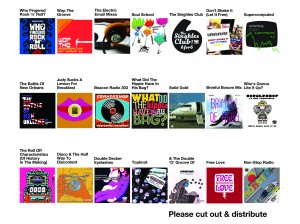Getting People Over the Beatles: A Series Examining the Greats of British (and UK) Pop Music – Wonders in the Dark Magazine
And today’s final selection is a bit of an obscure oddball representing how large, and thus wide the scope of BritPop became in such a short time (purists of the genre consider it to have only existed from late 1994 to sometime in 1998). Looking over the general consensus of BritPop there becomes a rather strict look and ideology to what it is, and as an American I can only say that the version we got was even more regimented then the one that was actually happening in the mid-1990s. But when one looks even just a little closer does the wealth of ideas (culturally, socially, and politically), and how radical many of them were begins to accurately take shape. Then, looking even closer does one start to find genuine different bands, on just aesthetics alone, as it’s way too easy (and incorrect) to reduce BritPop to ‘music just for laddish men’ created by said ‘laddish’ men.
Perhaps the most interesting of these bands was Cornershop. Culturally they represented the large Indian population of England, with even their name being derived from a racist connotation about their culture owning a perceived abundance of 7-11 like corner market shops. It was a tongue in cheek in-your-face account of their supposed place in British culture. In short, a perfectly quick representation of their ironic, satiric, and often politically refreshing multi-culturally embracing music.
They started with two EP’s (now both collected on the Elvis Sex Change [1993] disc), that showed the band in looser, rawer state. There’s plenty of lo-fi pop, but there is sonic noise experimentation too. From there 1994’s Hold On It Hurts (also stripped down indie meets leftist post-punk), and Woman’s Gotta Have It from 1995 (the first album where their unique sound – later called Hindi-pop – began to really take shape. They’re almost reclaiming the sitar, an Indian instrument, from the Anglos [most notably the Beatles] back to Indians and with it a symbol of their culture as a whole) began to show the multifaceted nature of Tjinder Singh‘s sly brilliance.
But it’s all a definite precursor to the main course, 1997’s stunning When I Was Born for the 7th Time. It’s an album that most here have probably heard, but were never aware of, more then a testament to easy hypnotic quality (plus ‘Brimful of Asha‘ was a surprise alt-hit of 1997, bringing them even if just for a second to the level of say an English Beck. The tunes are as interesting and varied, for this culture what Odelay was for American alt-pop in there collage like qualities). There are plenty of beat laden instrumentals where all their styles mix; there’s indian sitars, funk guitars, trip-hop and trance beats, essentially it’s a world music BritPop record, highly original, but never a novelty. It’s always grounded in a melodic sense of golden, glorious Pop.
Sure, ‘Brimful of Asha‘ was the hit (and it’s no wonder it’s one of the great songs of its era, or any era for that matter), but then there’s the smooth bass melody of ‘Candyman‘ (which us Americans will know from a recent LeBron Nike commercial), the homemade hip-hop of ‘State Troopers‘, ‘Good Shit‘ is the upwards surge of late 90’s optimism (and again, us Americans will know it from the Target ad), the lead track accordion whimsy of ‘Sleep On the Left Side‘ which gives ‘Asha‘ a run for the best single from the album, ‘Good to Be on the Road Back Home‘ is as authentic in the English rural style as anything Ronnie Lane ever offered, and finally there’s the cover of the definitive sitar Pop song of all time, the Beatles ‘Norwegian Wood (This Bird Has Flown)‘ which, in their native language, just soars to transcendency.
From there they’d release three more critically acclaimed albums (all are highly recommended; Handcream for a Generation [2002] has the added BritPop boost of featuring Noel Gallagher on a track or two, Judy Sucks a Lemon for Breakfast [2009] was a triumphant needed return what with the political climate what it was in the late 2000’s and it’s a glam rocker to boot, and 2011’s Cornershop and the Double ‘O’ Groove Of was yet another redefining of a band always looking to redefine not only themselves and their form [pop music] but the larger culture around them), and I must say, in a perfect world this Series wouldn’t need to exist for pop fans to listen to this type of stuff. ‘Everyone needs a buxom for a pillow’, my thoughts exactly. Just essential.
Posted in author Jamie Uhler, Getting Over the Beatles – Wonders in the Dark Magazine
_____________________________________________________________________________



